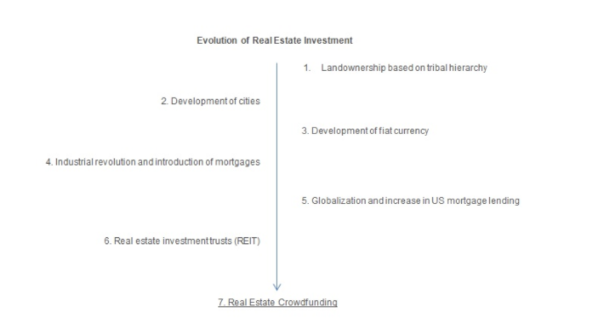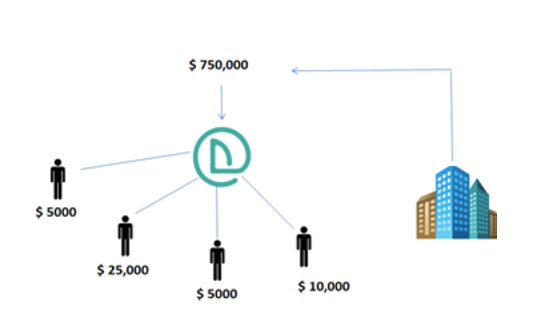

Real Estate /through the Ages
Real estate investments have evolved from simple land ownership to a complex global investment vehicle in the last few centuries with its latest derivative being real estate crowdfunding.

History and Development
Transition of our ancestors from hunter gathering to agrarian societies marked the first known instance of land ownership divided along the lines of tribal hierarchy. These lands were mostly around fertile plains of ancient rivers and their scarcity induced other tribes to claim them for their benefit provoking animosity and defence of these lands which gradually developed into cities and ultimately gave birth to the concept of homeownership.
These homes were developed by the city administration and divided amongst the inhabitants based on their skills and contribution to the city. Defence of the land therefore remained an important aspect of human societies throughout their nascent and modern history, defended or acquired land became a “property” with restrictions on access and use.
Scarcity contributed to the value of land and with the introduction of fiat currency gradually overtaking by force did not remain the only medium to acquire them. Scarcity continues to act as a price detrimental for real estate even in the 21st century.
Modern concepts around real estate ownership and trade started to develop after the industrial revolution around 1786 and introduction of mortgages due to an increase in personal income of the Middle class. The rise in American mortgages around 1949 and the de-colonization post World War II increased the size of the global market primarily driven by increase in US income to mortgage debt ratio from approximately 20% to 73%. Commercial airlines, availability of foreign capital, emigrations and development of new cities all helped accelerate demand of real estate ownership and investments. However the market was still dominated by a few firms and individuals, who had the capacity to buy many properties, hold them and later sell them at a higher price. All of this changed with the introduction of real estate investment trusts (REITS).
Although principally the concept of REIT’s has been around for centuries however it was legalized On Sept. 14, 1960 by President Dwight D. Eisenhower. Real estate investment trusts are created when a corporation (or trust) pools money from several investors to buy and operate an income producing real estate; it was designed so that large, income producing real estate assets would be available to the public. The industry developed rapidly throughout the last four decades and currently produces $69bn in annual revenue for investors and has over $4 trillion in market capitalization. (To find out more about REITS, read http://tinyurl.com/o3wse9x)
REIT’s offered many advantages to real estate investors some of them include:
- Higher than average yields
- Less risk through diversification
- Access to large income generating assets
- Benefit from asset price appreciation
- Hassle-free property management
However purchasing REIT’s still remain outside the confines of many small investors because they are generally purchased (and traded) via an exchange. Setting up an account with any exchange requires the same documentation and minimum capital requirements which are used to purchase stocks and bonds, additionally property management charges with many REITS reduce the net yield available to investors and many assets are held on a “long term” basis thereby minimizing any returns through significant price appreciations. Additionally decision of buying an asset remains outside the scope of an investor and is the sole discretion of the fund managers.
Real estate crowdfunding
From 1986 onwards with greater TCP/IP network access, internet proved to be a major accelerator of globalization and shared information. Slowly most brands and many tasks moved online for the convenience of the consumer including online banking, online stock trading, online gold trading and e-commerce to name a few. However real estate investment remained a strictly offline phenomenon with many portals like Zillow and Trulia simply offering property listings, market therefore was considered generally traditional and outdated with very little disruptive technology.
Real estate crowd funding however is considered a revolutionary method to raise real estate finance. According to Sven Anderson,of KPMG, companies in United States have been able to raise capital of upto $18 million through crowdfunding which as an industry is still in its infancy.
Crowdfunding Concept
Crowdfunding is a centuries old idea however with the rise of the internet it has become a viable investment alternative and expands the pool of investors to unrelated users with a shared investment appetite. Real estate crowdfunding is attractive to many investors since it has a much lower minimum capital requirement compared to typical asset management funds or REITS with typical ticket price of $5000. It is also time efficient and helps investors who want to diversify and add real estate to their portfolio. Real estate crowdfunding model also helps avoid fees to middle-man and helps communities invest in themselves.

Source: DURISE Real Estate Crowdfunding
The model has picked up rapidly after the Jumpstart Our Business Startups (Jobs) Act in 2011 which allowed crowdfunding equity through online platforms, one of its derivatives being real estate crowdfunding. Today investors are allowed to become part of investments in retail, commercial and residential properties for as little as $5000 and are entitled to rental returns and price appreciations just like any other real estate investor.
Real estate crowdfunding includes both debt and equity financing. On the one hand it allows individuals to own a property which provides them stable rental and price-to-price returns it also gives property developers a chance to raise debt or equity financing through small investors for their projects. (To find out more about real estate crowdfunding, read http://tinyurl.com/qdyx7al)
2011-Present
Primarily driven out of US the concept has expanded internationally with many websites as far as Hong Kong adopting this new method of investment. According to this report by Massolution, real estate crowdfunding is expected to raise $2.5 billion in 2015. Average market has grown by 156% year-on-year and keeping the current rate constant can grow to upto $10 billion by 2021. This is also highlighted by increased confidence shown by many Silicon Valley and other institutional investors and venture capital firms as highlighted by $23 million and $31 million funding rounds raised by two of many real estate crowdfunding platforms in the US.
Future
The rapid adoption of real estate crowdfunding and amendments to regulation A means that this industry is evolving rapidly and is poised to scale up significantly in the next few years. However some major obstacles will limit its growth principally the legal framework required for inter country transactions and lack of regulation for crowdfunding in developing economies. Additionally lack of consumer education about the industry will also limit its potential in the short-run.
Growth of real estate crowdfunding therefore is slightly “untapped” however in the long-run stability and growth of this industry is highly dependent on the introduction and success of a secondary market which allows investors to mitigate and manage risk more easily.
Since the underlying technology is still new and people are getting more informed it can be anticipated that the real estate market will be more accessible to investors and volumes through real estate crowdfunding will increase substantially. It will not be unreal to expect 100 times current industry volume to be achieved in the next couple of decades. Real estate crowdfunding is therefore the future of real estate investment which will gradually find its way in the retirement and personal saving plans of most consumers.
This post originally appeared on the Durise.com blog.

Comments